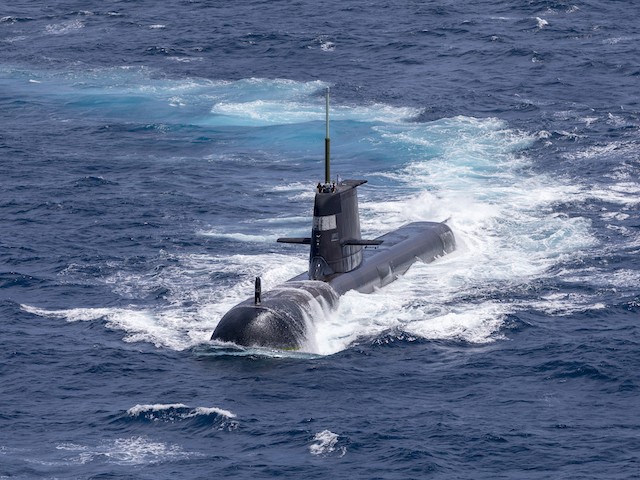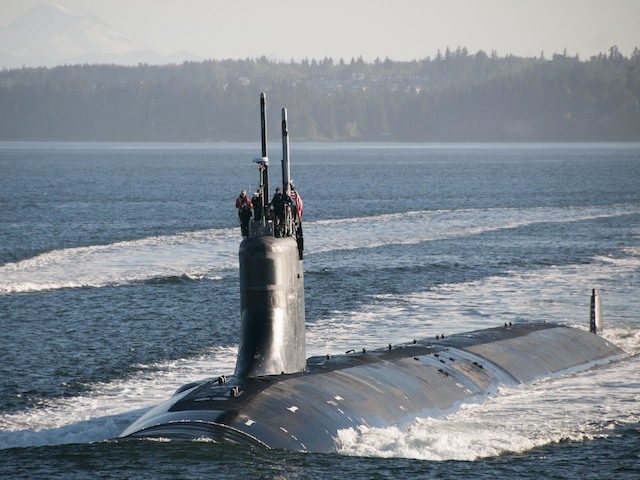The Chinese Foreign Ministry aggressively condemned Australia on Tuesday for announcing an agreement, alongside America and the United Kingdom, to upgrade its submarine fleet with major purchases of American nuclear-powered submarines, beginning in the early 2030s.
Chinese Foreign Ministry spokesman Wang Wenbin claimed that Australia owning the vessels – which American President Joe Biden insisted on Monday would be nuclear-powered, but not equipped with nuclear weapons – would create a “severe nuclear proliferation risk” and put the world on a “path of error and danger.”
The agreement announced in San Diego, California, on Monday – in the presence of Biden, British Prime Minister Rishi Sunak, and Australian Prime Minister Anthony Albanese – was born of an alliance the Biden administration branded the AUKUS, named after the three countries, and intended to protect the “free Indo-Pacific.” The Chinese Communist Party considers the alliance a direct threat to its ambitions in the South China Sea, where Beijing illegally claims territory belonging to five different countries, not including China’s own waters.
AUKUS was formed in 2021 and resulted in a diplomatic crisis after Australia abruptly canceled a deal to buy nuclear submarines from France, prompting Paris to withdraw its ambassadors from America and Australia and loudly protest that the American submarine deal was a “stab in the back.”
America’s Back? France recalls Ambassador to U.S. over submarine deal…First time ever! https://t.co/JNSqvCEM4u
— Breitbart News (@BreitbartNews) September 19, 2021
“The ultimate goal isn’t just selling subs to Australia, it’s developing something new together,” Biden said in formally debuting the deal on Monday. “We’re calling it the SSN-AUKUS. This new state-of-the-art conventionally armed nuclear-powered submarine that will work — that will combine U.S. submarine — UK submarine technology and design with American technology.”
“Simply stated, we’re putting ourselves in the strongest possible position to navigate the challenges of today and tomorrow together,” Biden said, insisting that the deal is not a threat to the region and naming China as a country that would benefit from Canberra-Washington cooperation.
The agreement consists of Australia buying up to five nuclear-powered American submarines in the 2030s and later building its own, with American help. According to the Australian government, Canberra will spend up to $245 billion on the project. The French project that the Australian government abandoned to accept the American deal would have cost about $66 billion; Australia is believed to have committed to paying France a cancellation fee on the signed contract for its nuclear submarines.
Chinese Foreign Ministry spokesman Wang Wenbin, responding to a question on the deal announced Monday, rejected any argument that Australia’s military ambitions would yield a positive result for the region.
“The latest joint statement from the US, UK and Australia demonstrates that the three countries, for the sake of their own geopolitical interests, completely disregard the concerns of the international communities,” Wang said, “and are walking further and further down the path of error and danger.”
Wang claimed the submarines to be built were creating “a severe nuclear proliferation risk” despite their lack of nuclear armament and “violate[d] the aims and objectives of the Non-Proliferation Treaty.”
The Chinese government regularly demands that the United States and its nuclear-armed allies destroy their arsenals. In December, the Foreign Ministry directly demanded that America “take substantial and substantive cuts to its nuclear arsenal” and pursue “complete and thorough nuclear disarmament.”

File/Royal Australian Navy submarine HMAS Rankin is seen during AUSINDEX 21, a biennial maritime exercise between the Royal Australian Navy and the Indian Navy on September 5, 2021 in Darwin, Australia. (POIS Yuri Ramsey/Australian Defence Force via Getty Images)
China’s government media arms, in contrast, have demanded China “rapidly increase the number of commissioned nuclear warheads.” The Pentagon warned in a report in November that China is seeking to nearly quadruple its nuclear warhead arsenal by 2035. China is also the closest diplomatic ally of the world’s most belligerent nuclear rogue state, North Korea, and has a longstanding alliance with the nuclear criminal state of Iran, with minimal criticism for the illegal nuclear weapons programs of either.
The Global Times, one of China’s most combative state propaganda outlets, called the submarine deal a “time bomb” on Monday. Its regime-approved “experts” claimed that the deal would erode Australian sovereignty as the submarine fleet would essentially “be a de facto offshoot of the U.S. nuclear submarine fleet.”
“It would be a time bomb for peace and stability in the region. Australia should not fall into the category of a saboteur of regional security just because of US pressure,” a pro-regime professor identified as Chen Hong warned.
Elsewhere in its pages, the Global Times compared the AUKUS deal to China helping restore diplomatic ties between Iran and Saudi Arabia. The three countries announced that Riyadh and Tehran had agreed, during meetings held in Beijing, to reestablish formal diplomatic relations and send ambassadors to each other’s capitals. Saudi Arabia and Iran are bitter geopolitical rivals, but both are seeking membership in the economic and political coalition BRICS (Brazil, Russia, India, China, and South Africa), which would require at least cordial, if not warm, exchanges between them.
“When China sits down with friends, it is for peace. When the US and its partners get together, the agenda is about confrontation,” the Global Times condemned. “Since the announcement of AUKUS 18 months ago, many observers, including those from Australia, have said the alliance, under the guise of nuclear-powered submarines cooperation, is essentially about US arming Australia and turning it into a US military asset against China, laying a timed bomb for peace and stability in the region.”
Follow Frances Martel on Facebook and Twitter.

COMMENTS
Please let us know if you're having issues with commenting.